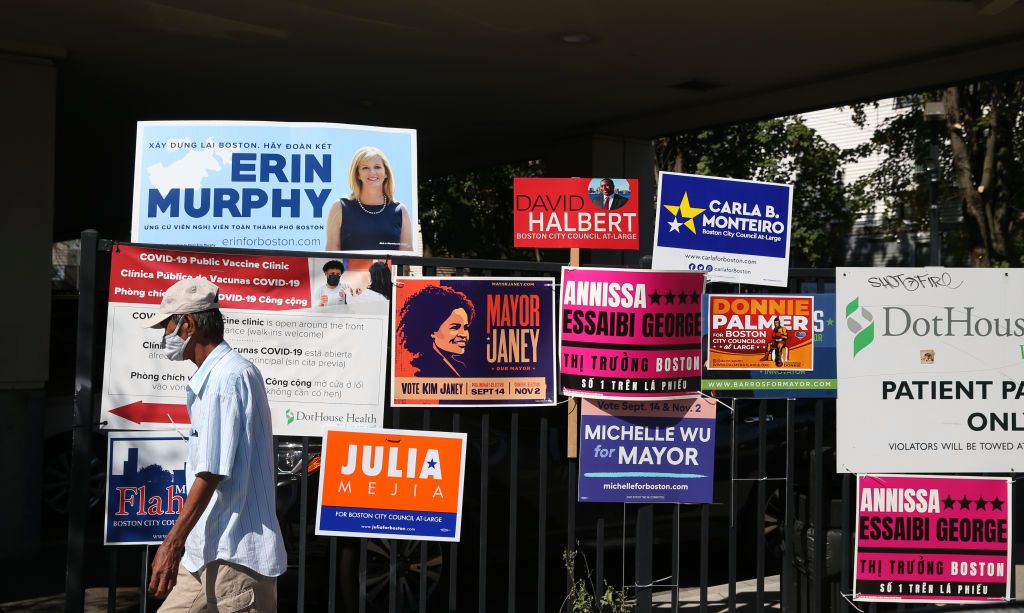Boston Moves Closer To Electing First Non-White Male Mayor, But She Won’t Be Black
A variety of mayoral and city councilor candidate signs in Boston’s Dorchester on Sept. 14, 2021. | Source: Boston Globe / Getty
Boston moved closer to electing its first non-white male mayor in city history following the primary election on Tuesday.
But that person will not be Black, as voters rejected the campaign of acting Boston Mayor Kim Janey, who became the first woman and first Black person to lead the nearly 400-year-old city after now-former Boston Mayor Marty Walsh was confirmed as President Joe Biden’s U.S. Secretary of Labor in March.
More than five percent of votes in the Boston mayoral preliminary election have been reported. Track live results on this page: https://t.co/KlaOvezEcC #bospoli pic.twitter.com/WtaSNyY99S
— The Boston Globe (@BostonGlobe) September 15, 2021
Instead, City Councilors Annissa Essaibi George and Michelle Wu — the top two vote-getters in Tuesday’s mayoral primary — advanced to faceoff in the general election in November, ensuring Boston will elect its first woman mayor.
The field of candidates was historically diverse for a city that has long been dogged by a reputation for racism.
Two of the main candidates were Black women, including Janey, the former city council president, and current Councilor Andrea Campbell. Essaibi George and Wu rounded out the top four candidates, with John Barros, the city’s former economic development chief, who is Black, also running.
Cambell and Janey both conceded defeat graciously and acknowledged the historic progress made with their campaigns, the Boston Globe reported.
Campbell said she was “proud” of her campaign.
“It’s not the result we wanted. It’s not the result we expected,” Campbell said. “But we have something to be extremely proud of.”
Andrea Campbell conceded defeat tonight at Prince Hall before a supporters who stayed late to hear her speak. She said she called Michelle Wu and Annissa Essaibi George to congratulate them— the latest indication that it will, in fact, be Wu v. Essaibi George in the Nov. 2 final pic.twitter.com/5JVecexEcI
— Bill Forry (@BillForry) September 15, 2021
Janey suggested she was still holding out hope while also realizing that her loss was increasingly inevitable.
“While we are still waiting on some results, it appears that we have come up short in the election,” Janey said before recognizing the history she made during her brief tenure leading Boston.
“At City Hall — as the first woman and first Black mayor of Boston — we not only made history, but we made a difference,” Janey added.
Just-in: Acting Mayor Kim Janey acknowledges “it appears we have come up short” in mayoral race… congratulates Wu and Essaibi George. #bospoli pic.twitter.com/gmejaB70NL
— Bill Forry (@BillForry) September 15, 2021
It was not immediately clear whether the primary was a referendum on Janey — who has faced scrutiny for her leadership during the pandemic, including most recently a controversy over mask mandates — or a credit to Essaibi George and Wu.
At face value, it was hard to ignore the fact that Boston — which has consistently been ranked among the most racist places for Black people — remained one of the few major American cities to have never elected a Black mayor.
While Janey led the city, Boston enjoyed a rare but brief distinction as one of the few American cities to have a Black mayor, a Black Congressman with Rep. Ayanna Pressley and a Black district attorney in Rachael Rollins.
SEE ALSO:
‘Racist’ Boston On Track To Elect First Non-White Male Mayor In History
Acting Boston Mayor Kim Janey Becomes First Black Person To Lead The City
[ione_media_gallery id=”4198034″ overlay=”true”]

